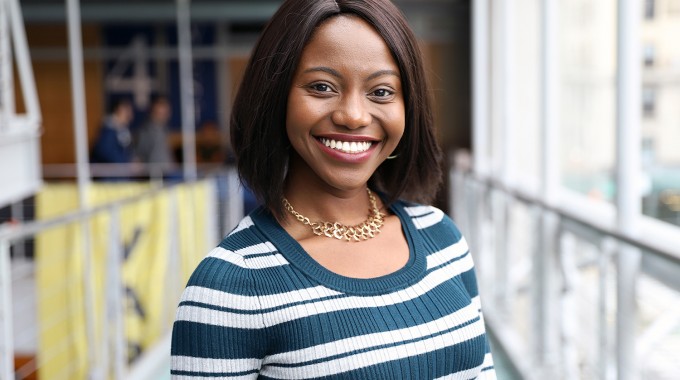If you know of a Columbia College student, faculty member, alumnus/alumna or program we should spotlight, or if you would like to submit a story, please contact:
Columbia College
Office of Communications
cc-comms@columbia.edu

“Nothing brings people closer together than struggle...if you’re able to overcome things together — this is why family sticks together and how friendships get close. It’s been tested.”—Regine Francois CC’19
When Regine Francois CC’19 chose to attend Columbia College, People paid attention. The magazine wrote about Francois’s decision and cast the Haitian immigrant into the public eye. She had been accepted to several Ivy League universities. She was first in her family to finish high school and was graduating at the top of her class in Immokalee, FL, a town more than 100 miles from Miami.
In Immokalee, nearly half the residents live below the poverty level. Francois’ family — she has five younger siblings — struggled with hunger. Her father was one of the many local migrant farm workers whose labor supplies some 90 percent of America’s tomatoes, according to Francois.
“Nothing brings people closer together than struggle,” she says. “If you’re able to overcome things together... — this is why family sticks together and how friendships get close. It’s been tested.”
In her senior year of high school, Francois and several of her classmates founded Taste of Immokalee, a grassroots effort selling salsa based on personal family recipes, the proceeds of which would go back to the Immokalee community. Their idea and product became a commercial success. It would go on to grow into a nonprofit providing leadership and business training to local youth.
Taste of Imokalee was just one of Francoise’ achievements before she matriculated at Columbia — she’d tutored younger low-income students and was accomplished in track and cross country. And yet, she remembers feeling unsure of her journey, calling her first year “a wake up call…. I’d never done anything like this!”
Francois thankfully found her footing early on through the Academic Success Programs community. “Being grounded, being able to have those conversations pretty early helped me to see that it’s not just hard for me,” she said. She also told herself, “I can try, and I am going to get better.”
Francois would experience more transformation later that first year, during an internship with a community-based organization in Uganda, promoting malaria intervention. When she realized success was not as simple as providing supplies, something in her “fundamentally shifted,” she says.
“Uganda helped me to see it’s important that I’m positive and idealistic but I also have to be very realistic. It showed me that as much as people can preach sustainability, it is messy,” Francois adds. “It is hard. Good intention just doesn’t translate into good benefits for people.”
Francois began to reflect on her anticipated majors — international development and business. “What do I mean whenever I want to help someone overcome hunger?” she remembers asking herself. “That kind of work is going to take a lot more time than just passing out meals. You’re talking about agriculture, teaching and so many different things.”
The consideration of all this, along with how much she enjoyed her comparative ethnic studies course, led Francois to major in sustainable development and sociology. “We talked [in the global Core class] about the nuances of identity, intersectionality and how history has been saying ‘these people matter’ long before we created movements for it,” she says”. And the professor [Deborah Paredez, associate professor of professional practice in writing in the School of the Arts] made everyone’s contribution seem like the most valuable addition to the discussion.”
The spring of junior year, Francois studied abroad in Chile. She focused on immigration and its impact on Chilean identity. The semester in Santiago “taught me to just be brave,” she says. “You’re going to school and doing work but in a whole different language.”
Francois conducted research in Spanish, including six hour-long interviews. By the end of her trip, her Chilean friends not only considered her nearly fluent; one said, “It’s more like I speak Regine,” Francois laughs. “One of the things I learned is, love is not limited by language.”
In fact, for Francois, who is president of the Haitian Students Association, love is literally baked into service. When the association’s premiere gala had its food budget cut, Francois did what she perhaps does best — cook up something new and fulfilling. “I was up until four in the morning making Haitian macaroni for 60 people, but we did it,’ she says. “We raised several hundred dollars to support Experience Ayiti [a nonprofit that provides music education to youth in Haiti].”
When asked to define Haitian macaroni Francois thinks a moment and laughs. “Love,”she says, before listing the ingredients — small pieces of red and green peppers, onion and ham mixed with mayonnaise, cheese and milk, cooked and then poured over penne pasta.
After graduation, Francois will continue to feed her soul with a career in ministry and public speaking, and will work with Taste of Immokalee, continuing to serve many communities with love.